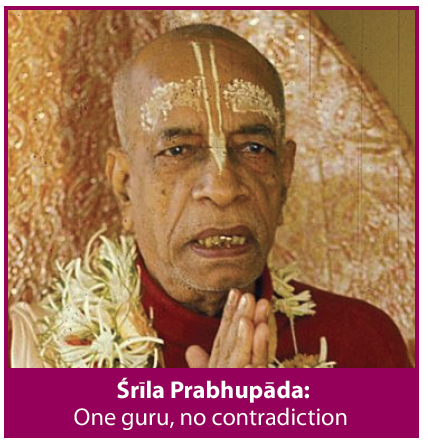
Back To Prabhupada, Issue 64, Vol 4, 2019
he GBC recently passed the following resolution allowing females to become diksa gurus:
"1. Vaisnavis are eligible to give diksa in ISKCON provided that they:
a. Meet all the qualifications listed for ISKCON diksa-guru applicants;
b. Are at least 55 years of age and in a stable family situation, living under the protection of a husband, elder son or son-in-law, qualified householder couple or senior Vaisnava or Vaisnavi sanga;
c. Receive written permission from the appropriate regional body or its equivalent, or national council, to give diksa in that particular part of the world."
(Passed 15/10/19)
This change to the GBC guru franchise is the latest in a long line of many different guru systems since Srila Prabhupada's physical departure that the GBC has claimed to be "authorised". We list these below.
1978: Only 11 male disciples could be diksa guru. See GBC resolution 403, 1999 explaining this system of "eleven exclusive successor diksa gurus".
1978: Gurus were selected by Srila Prabhupada. See GBC resolution 16, 19/3/78 which claims that these 11 gurus were directly selected by Srila Prabhupada.
1982: Only male disciples recommended by initiating gurus and who get ¾ votes of the GBC body can be diksa guru. See GBC resolution 1, 27/2/82.
1986: Only male disciples recommended by GBC members who get majority votes of the GBC body can be diksa guru. See GBC resolution 3, 30/3/86.
2002: Only male disciples and grand-disciples recommended and approved by the GBC can become diksa gurus. See GBC resolution 303, 2002.
2009: Any male or female can become diksa guru, as per the GBC guidelines, with eligibility rules for men and women the same. See GBC resolution 305, 2009.
2015: Grand-disciples and females suspended from acting as diksa gurus. See GBC resolution 310, 2015.
2019: Grand-disciples allowed to become diksa gurus again. See GBC resolution 700, 2019.
2019: Females with restricted eligibility compared to men allowed to be diksa gurus. See GBC resolution 15/10/19.
1984: Re-initiation compulsory to be connected to parampara for those whose gurus have "fallen". See GBC resolution 1, 6/3/84.
2012: Reinitiation not needed to be connected to the parampara for those whose gurus have "fallen". See GBC resolution 311, 2012.
Thus, the GBC has changed its mind at least 10 times regarding whether only some or all males disciples can be diksa gurus, whether grand-disciples can be diksa gurus, whether females can be diksa gurus, how one becomes guru and whether one always requires a guru who is not fallen. A paper given by the GBC explaining its new resolution authorising female diksa gurus, states:
"The primary bases for this decision are the expressed desires and instructions on guru qualifications of ISKCON's Founder-acarya His Divine Grace Srila A.C. Bhaktivedanta Swami Prabhupada."
(GBC, 17/10/19)
However, it should be noted that each time they have given a new guru system, they have always claimed that system is based on Srila Prabhupada's instructions, which of course means that the previous system was not – even though they had claimed at the time that it was also what Srila Prabhupada ordered! Hence, every time they put forward a statement on a change to the guru system, all they are really saying is that they were previously completely wrong multiple times regarding what Srila Prabhupada's instructions on gurus were, and of course they could be wrong again! Thus, the GBC's many changing guru systems highlight its ignorance of Srila Prabhupada's instructions regarding how initiations are to be conducted in ISKCON.
 |
However, if Srila Prabhupada had issued a clear order regarding guru succession, the order would obviously have made clear who Srila Prabhupada ordered to succeed him and how – otherwise it would not have been an order for someone to succeed him! And there would have been no confusion and contradiction over whether he ordered 11 men, all men, all men and women, or all men and women including grand-disciples, to be his successors. Therefore, the ignorance of the GBC regarding guru succession actually shows that Srila Prabhupada did not give such a succession order. And it is this absence of any guru succession order from Srila Prabhupada that has resulted in the GBC trying to fill the gap by contriving to continually construct different contradictory guru succession systems. The latest resolution is another example of this. The GBC states in its explanatory paper:
"Srila Prabhupada severely criticized and warned against bodily and mundane considerations in regard to the role and eligibility of diksa-guru".
(GBC, 17/10/19)
Yet, they are offering a two-tier successor diksa guru system actually based on "bodily" considerations – because women must be at least 55 and be "protected" to be diksa gurus, but men do not. However, Srila Prabhupada never ordered such a two-tier "bodily" diksa guru system. The paper mentions:
"Srila Prabhupada's approach to the balance between spiritual and societal roles of Vaisnavas and Vaisnavis in the context of pure devotional service".
But, Srila Prabhupada never stated that a pure diksa guru is ever subject to "societal roles". Rather, he stated the opposite:
"If Hari is free to act as He likes, the empowered spiritual master is also free."
(Cc., Madhya-lila, 10.136, emphasis added)
Thus, the GBC has again been forced to make up its own system, because actually Srila Prabhupada did not authorise any diksa guru successors – period.
The GBC has been forced to concoct ever-changing, contradictory guru succession systems – because Srila Prabhupada did not give a guru succession order for men or women! Rather, he alone remains the diksa guru of ISKCON.
Return to GBC Index
Return to IRM Homepage